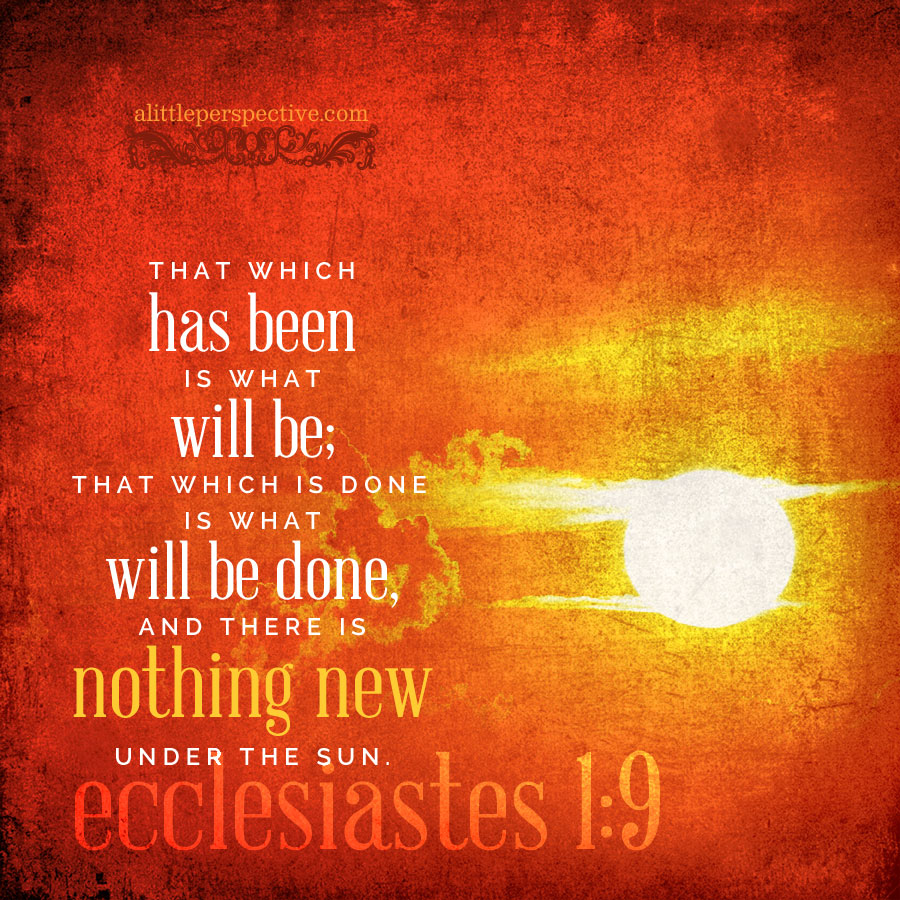Read Ecclesiastes 1 and 2 at Bible Gateway.
The Hebrew paragraph divisions:
Ecc 1:1-11 {p} The earth abides forever, and there is nothing new under the sun
Ecc 1:12-3:1 {p} The works of man are in vain, for death + an end awaits all men
Ecc 1:12-3:1 {p+p} chiastic structure:
introduction) Ecc 1:12, I, the Preacher, was king over Israel in Jerusalem;
1a) Ecc 1:13-18, I set my heart to search by wisdom what is good to do under heaven;
1) Ecc 1:13a, I set my heart to seek + search out by wisdom concerning all that is done under heaven;
2) Ecc 1:13b, This burdensome task God has given to the sons of man, by which they may be exercised;
3) Ecc 1:14-15, All work done under the sun is vanity, for there is no end to it;
4) Ecc 1:16, I have attained more greatness + wisdom + knowledge than any before me in Jerusalem;
5) Ecc 1:17-18, I set my heart to know wisdom + folly/ it was vanity, for grief + sorrow is in much wisdom;
1b) Ecc 2:1-11, I looked on all the works of my hands/ it was vanity, for there was no profit under the sun;
1a) Ecc2:1-3, I tested my heart with pleasure (but it was vanity) to see what would profit a man under heaven;
1b) Ecc 2:4-7a, I made my works great: houses, vineyards, gardens, pools, servants;
1c) Ecc 2:7b, I had greater possessions of herds + flocks than all who were in Jerusalem before me;
central axis) Ecc 2:8. I gathered for myself silver + gold + treasures/ singers/ women, very many;
2c) Ecc 2:9-10, I became great in works + riches + wisdom more than all who were before me in Jerusalem;
2b) Ecc 2:11a, I looked on all the works + labor that my hands had done + had toiled;
2a) Ecc 2:11b, 1) And indeed all was vanity and grasping for the wind/ 2) there was no profit under the sun;
1c) Ecc 2:12-16, I considered wisdom + folly/ the man who succeeds the king/ the wise + fool alike both die;
1d) Ecc 2:17a, Therefore I hated life because the work that was done under the sun was distressing to me;
central axis) Ecc 2:17b, For all is vanity and grasping for the wind;
2d) Ecc 2:18a, Then I hated all my labor in which I had toiled under the sun;
2c) Ecc 2:18b-21, The man who will come after the king/ wise man or fool/ the wise leaves his labor to others;
2b) Ecc 2:22-23, What profit has man for all his labor under the sun? His heart does not rest from it/ this is vanity;
2a) Ecc 2:24-26, Nothing is better but to eat + drink + enjoy good in his labor/ vanity;
1) Ecc 2:24a, Nothing is better for a man but to eat + drink + enjoy good in his labor;
2) Ecc 2:24b, This also, I saw, was from the hand of God;
4) Ecc 2:25a, For who can eat, or who can have enjoyment, more than I?
5) Ecc 2:26a-c, God gives wisdom with joy to the good/ the sinner gathers, to give to the good;
3) Ecc 2:26d, This also is vanity and grasping for the wind;
conclusion) Ecc 3:1 {p} To everything there is a season, a time for every purpose under heaven.
Wisdom Solomon learned: There is no end to labor, for something will always be wanting (Ecc 1:14-15). This is why it is a great folly not to rest on the Sabbath because the work has not yet been completed. The wise know that the work will never be completed, so rest!
This strong paragraph of Ecc 1:12-3:1 is the record of Solomon’s journey to despair and back, because of his great wisdom. He set his heart to discover by wisdom, what would be the best thing for man to spend his life doing. He tested great works, riches, wisdom, folly, and pleasure. He discovered that all men, no matter what they do, encounter the same end of death, so he concluded that no matter what men do, it is all in vain, profiting nothing in the long run.
When he began, he had joy in the testing:
Whatever my eyes desired I did not keep from them. I did not withhold my heart from any pleasure, for my heart rejoiced in all my labor; and this was my reward from all my labor. Ecc 2:10
But after time, his joy turned to despair, when he realized that his labor, that he had spent his life, his wisdom, and his riches in doing, also would not long outlast him:
Therefore I turned my heart and despaired of all the labor in which I had toiled under the sun. Ecc 2:20
This was very distressing for Solomon, but he discovered anew an important spiritual law: man’s works do not have eternal profit, but only benefit the man in his lifetime (which, since life ends, he viewed with despair as a bad thing).
Life on this side of heaven ends, but life does not end. But since the plan of salvation was veiled even to Solomon for all his great wisdom, he did not have a clear understanding of his future hope.
His hatred of his life, because of learning this principle, I think probably was the root of bitterness that caused him to descend into idolatry. But, when enough time had passed, and he had increased in the even greater wisdom that lies on the other side of this spiritual law, he realized that it was a gift from God to enjoy the present good benefit of your labor (Ecc 2:24), for God gives wisdom with joy to the good (Ecc 2:26, as opposed to wisdom with despair, Ecc 1:18). In other words, he learned contentment: the fruit of trust and rest in God.

















Leave a Reply